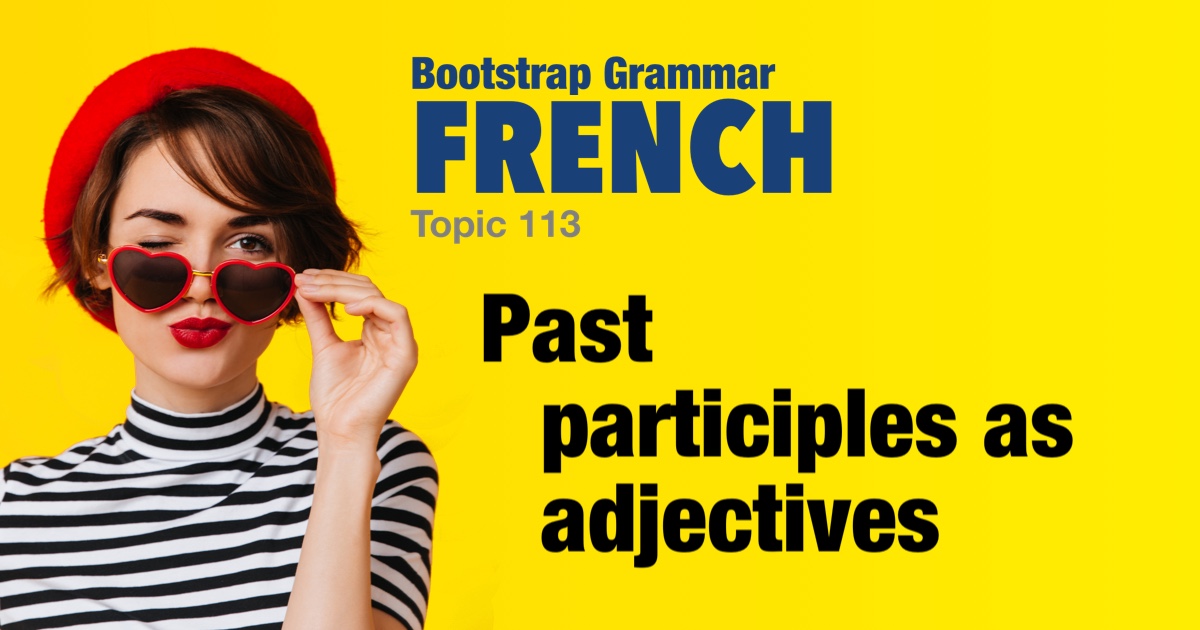French grammar - Past participles as adjectives |
|||
|
|||
Past participles can often be used as adjectives. Indeed, we have already used many such adjectives already. When used as an adjective, the past participle needs to agree in gender and number with the word it modifies, following the normal rules of adjective agreement. |
| Examples: | |
|
La porte est ouverte.
The door is open. |
|
|
Il a ouvert la porte. La porte reste ouverte.
He has opened the door. The door remains open. |
|
|
Elle est réveillée.
She is awake. |
|
|
Elle s'est fait réveiller tôt. Elle est maintenant réveillée.
She got woken up early. She is now awake. |
|
|
Les devoirs sont faits.
The homework is done. |
|
|
Je leur ai fait faire leurs devoirs. Les devoirs sont enfin faits.
I made them do their homework. The homework is finally done. |
|
|
Leur accord commercial est rompu.
Their business agreement is broken.
|
|
|
Ils se sont disputés et l'accord est rompu.
They had an argument and the agreement is broken. |
|
|
Les barrières sont rompues.
Barriers are broken/bent.
|
|
|
Les bicyclettes sont cassées.
The bicycles are broken/smashed.
|
|
|
La tâche est finie.
The task is finished. |
|
|
Nous nous sommes vraiment appliqués et la tâche est finie.
We really applied ourselves and finally the task is finished.
|
|
|
Mes grands-parents sont décédés.
My grandparents are deceased.
|
|
|
Pourquoi est-elle fâchée ?
Why is she angry?
|
|
|
Il y a une voiture arrêtée au carrefour.
There is a car stopped at the crossroads.
|
|
|
Fatigué, je suis rentré à minuit.
Tired, I came home at midnight.
|
|
|
Nous sommes épuisées.
We are exhausted.
|
|
|
Le petit chien assis sur le canapé est mignon.
The little dog sitting (seated) on the sofa is cute. |
|
|
Je ne peux pas voir d'homme agenouillé.
I cannot see a (any) kneeling man.
|
|
|
Ces livres sont écrits en italien.
These books are written in Italian. |
|
|
Ces solutions proposées ne sont pas parfaites.
These suggested solutions are not perfect.
|
|
|
Le garçon déçu a pleuré.
The disappointed boy cried.
|
|
|
Déçue aussi, la fille a pleuré aussi.
Disappointed too, the girl cried too. |
|
|
Il est perdu, comme d'habitude.
He is lost as usual.
|
|
|
Leur fils est trop gâté.
Their son is too spoiled.
|
|
|
Le mois passé, il a eu la grippe.
The past month he had the flu. |
|
|
Chaque seconde passée ici est dangereuse.
Every second spent here is dangerous. |
|
|
Ce sont des hommes distingués.
They are distinguished men.
|
|
|
Ils sont assis près de la scène.
They are sitting near the stage. |
|
 |
|



 fâcher (verb) 'to anger'
fâcher (verb) 'to anger'